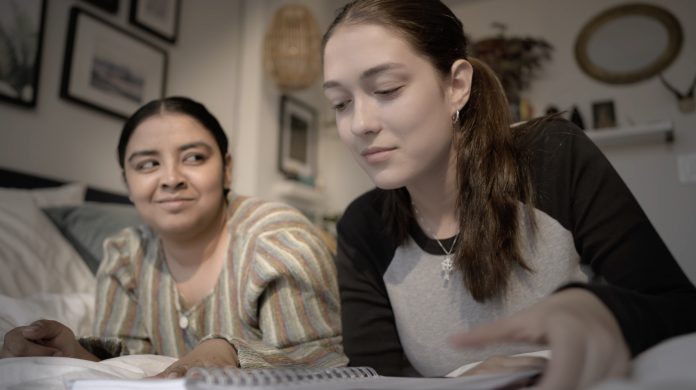by Patrícia Colmenero
I had missed the screening and knew nothing about the film, but the director Razid Season’s award acceptance speech at the festival felt like a film in itself. Razid spoke about how Elijah almost wasn’t made. Even with a grant in hand, he had tried to give it back because he couldn’t find actors to play a Bengali family in New York with a teenage trans person at the center. Razid searched for actors for one year. He went door to door and attended Bengali community and social gatherings but did not find anyone who would agree to work. Some feared backlash within their own circles; others did not have time due to full-time jobs. What he ran into wasn’t a lack of courage; it was the invisible tax of class—shift work, remittances, childcare, the fear of being seen in a queer story on top of it: everything that makes art feel like a luxury. That’s why his refusal to relent landed like kinship.
He solved it by turning to the neighborhood stage. From community theater he assembled a family—Ajaz Alam (father), Debjani Banerjee (mother), Mithila Gazi (their child)—each Bengali, each with deep stage roots and no on-camera history. He kept the film in Bengali to honor the real Elijah, whom he first met while interpreting in a hospital crisis unit; language here isn’t ornament, it’s a promise to the life that sparked the story.
At one point he situated Elijah within its regional film lineage: in South Asian and Himalayan cinema, stories centering trans women are far more visible than those centering trans men. Speaking as a Bangladeshi Muslim immigrant a decade into the U.S., he set out to widen that frame, centering a Bengali family and their trans son, and telling the story in Bengali so it speaks from inside the culture rather than about it.
When I finally watched Elijah, the first image that anchored me was a curtain: his room literally partitioned from the house by fabric that opens and closes, a soft door the camera sometimes crosses and sometimes is left behind it. That veiling/unveiling becomes the film’s grammar: Elijah searching for a self he can bear to reveal; a mother negotiating how to belong to her community without disclosing her true family; and a father crushed by the taxi/Uber bust, numbing himself after shifts, watching an LGBTQ segment and projecting his hurt onto the screen. Razid names that pressure with precision: the sickness called the American Dream, where drivers disappear, friends are lost, and the math of survival doesn’t add up. No one stays on the surface: the father, who seems the most rigid, surprises us; he goes looking for his son and finds, if not answers, then a path back to a frayed sense of community. The curtain motif carries through to a literal unveiling—Elijah’s hair—and to the camera’s ethic of disclosure: show, then shield; shield, then show. It’s a queer film, yes, and also a film about work, migration, and belonging; the partition becomes a threshold, and crossing it is what allows love to keep up with change.
Listening to Razid under the spotlight, I felt something shift. His struggle, his resourcefulness, his refusal to abandon the story: it gave me one of those rare moments when you fall in love with cinema all over again. Because here was proof that even in an industry that feels unfair, where films with ethical urgency often go unseen or unsupported, someone had made the impossible possible. In that instant, the hopelessness I so often carry—the cost, the grind, the indifference of the city—was replaced by a flicker of hope. Hope in cinema, hope in my community of filmmakers, hope in the very act of making. That night, that speech, sent me searching for Elijah.
To learn more about the film: https://www.razidseason.com/1_6_elijah-new-production
—————————————–








